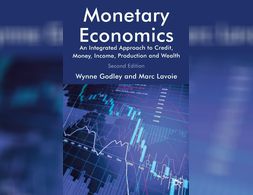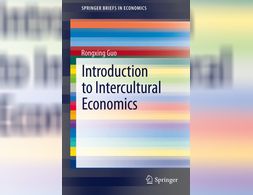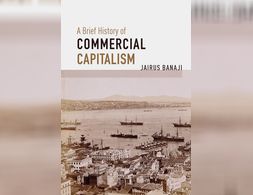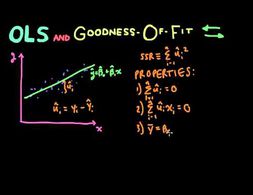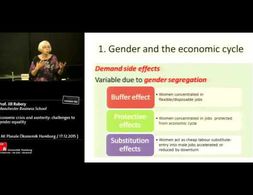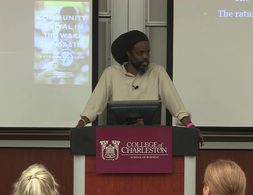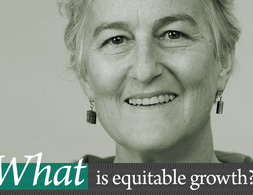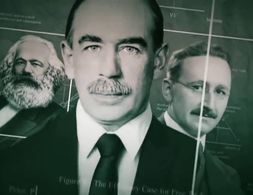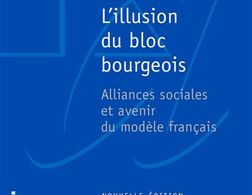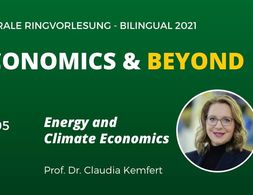1268 results
The podcast discusses how to deal with the rising inflation and presents a comparative perspective between the US and the EMU. Basically the speakers discuss whether we are heading to a stagflation in Europe similar to the 1970s and they compare the macroeconomic dynamics in the United States vs. the EMU.
Commons stand for a plurality of practices ‘beyond market and state’ as the famous Commons scholar – and first female noble prize winner of economics - Elinor Ostrom put it. Their practice and theory challenge classical economic theory and stand for a different mode of caring, producing and governing. Within this workshop we want to dive into theory, practice and utopia of Commons following four blocks...
This book challenges the mainstream paradigm, based on the inter-temporal optimisation of welfare by individual agents. It introduces a methodology for studying how institutions create flows of income, expenditure and production together with stocks of assets and liabilities, thereby determining how whole economies evolve through time.
Designed for a single-semester undergraduate course, this introductory economics textbook updates traditional macroeconomics to encompass twenty-first century concerns. In contrast to standard texts, the book starts with the question of human well-being, and then examines how economic activities can contribute to or detract from it.
New Tools of Economic Dynamics gives an introduction and overview of recently developed methods and tools, most of them developed outside economics, to deal with the qualitative analysis of economic dynamics. It reports the results of a three-year research project by a European and Latin American network on the intersection of economics with mathematical, statistical, and computational methods and techniques.
Economic development is a process of continuous technological innovation and structural transformation. Development thinking is inherently tied to the quest for sustainable growth strategies. This book provides a neoclassical approach for studying the determinants of economic structure and its transformation and draws new insights for development policy.
The U.S. economy today is confronted with the prospect of extended stagnation. This book explores why. Thomas I. Palley argues that the Great Recession and destruction of shared prosperity is due to flawed economic policy over the past thirty years.
Despite the Doha declaration of November 2001, the failure to start a new round of global trade negotiations at Seattle in December 1999 and the hostility of protesters to the trade liberalization process and growing global economic and social disparities was a wake-up call for the World Trade Organisation (WTO).
This book presents a methodological framework for the analysis of intercultural issues frequently misinterpreted by existing theories. It uses a challenge-and-response theory of cultural development to examine the relationship between different natural disasters and threats and the developments of ancient civilizations.
The book deals with the financial instability hypothesis of Hyman P. Minsky and its application to current developments. The first part of the work summarizes the hypothesis and mentions works elaborating the hypothesis. The second part applies the hypothesis to the financial crisis 0f 2008/09.
The recent financial meltdown and the resulting global recession have rekindled debates regarding the nature of contemporary capitalism.
The rise of capitalism to global dominance is still largely associated – by both laypeople and Marxist historians – with the industrial capitalism that made its decisive breakthrough in 18th century Britain.
The relationship between race and capitalism is one of the most enduring and controversial historical debates. The concept of racial capitalism offers a way out of this impasse.
David Graeber introduces different concepts such as money and debt. He takes a historical and anthropological way of explaining the origin. This breaks with the mainstream explanation, which is used in many Economics textbooks, saying that a barter economy was before money arose.
The blog post by Marc Lavoie contrasts what he perceives as the two main interpretations of the current inflationary tendencies (the 'excessive demand inflation' story and the 'profit inflation' story) and contrasts them with a third interpretation. This interpretation acknowledes rising profits but argues in favor of a different mechanism that centers on changes in the relative composition of costs.
The world's leading economist of inequality presents a short but sweeping and surprisingly optimistic history of human progress toward equality despite crises, disasters, and backsliding.
This unique up-to-date volume not only provides state-of-the-art discussions of the most recent developments in modern macroeconomics but also includes a series of interviews with leading economists that shed new light on the major intellectual and policy issues of the 1990s. The book is at once an invaluable text and a superb overview that will be welcomed by teachers and students alike.
The Privatized State shows how privatization undermines the very reason political institutions exist in the first place, and advocates for a new way of administering public affairs that is more democratic and just.
This open access book presents an alternative to capitalism and state socialism through the modelling of a post-market and post-state utopia based on an upscaling of the commons, feminist political economy and democratic and council-based planning approaches.
First some properties about the Sum of squared residuals and the linear regression function are restated. In particular three properties that an ideal fitted regression line must fulfill are discussed. Then, the R squared is defined using the measures of the Sum of squared residuals, the total sum of squares and the sum of explained squares.
Departing from an analysis of women's employment and changing gender regimes in the pre crisis period, Jill Rubery illustrates how the crisis affects men's and women's employment differently. Afterwards, she discusses the crisis' impact on gender relations. Based on empirical findings, she shows how men were more affected by the recession and women more by austerity and presents possible explanations. Those are furthermore linked to women's employment decisions and prevalent gender regimes. In particular, Rubery discusses cut backs in public spendings on care, flexibilization and the role of conservative gender ideologies.
In this talk, Virgil Henry Storr, a Research Associate Professor of Economics in the Department of Economics at George Mason University, talks about his research into to post-disaster recovery and the role that social entrepreneurship plays in rebuilding the communities and social networks that get disrupted, or entirely eliminated.
What is “equitable growth” and how do we measure it? A better understanding of equitable growth—and how to measure it—can improve our understanding, inform decisions and lead to better outcomes for all.
During his life, Keynes was credited with, amongst other things, with helping to save capitalism from the Great Depression, funding the war against the Nazis and building post-war decades of growth and rising prosperity. And when the global crisis struck in 2008, it was his ideas that the world's leaders turned to help avoid another depression.
In this short video behavioural economist, Dan Aerily talks about how our cognitive illusions will trick us into believing something that is otherwise deemed irrational by the homo economicus. It raises and probes into some very interesting questions that defy the neoclassical rational behaviour.
Ce podcast présente l’incompatibilité entre notre modèle économique et l’exigence écologique. « Comment affronter sérieusement les désordres de la planète si l’on s’évertue à réanimer un modèle économique qui en est la cause » ? s’est exclamé Gaël Giraud (chef économiste de l’Agence Française de Développement). La question de l'équation entre les impératifs économiques de court terme (croissance, emploi) et les exigences planétaires de long terme (l'avenir de notre monde) semble toujours irrésolue.
Leçon du cours au Collège de France de Philippe Aghion "Économie des institutions, de l'innovation et de la croissance"
In this article, Perry Mehrling, a professor of economics at Barnard College, presents and discusses three theories of banking which are guiding bank regulation. These are credit creation theory, fractional reserve theory and debt intermediation theory.
Dani Rodrik, Professor of International Political Economy at Harvard's Kennedy School of Government, is teaching in this online session about the global rules under which the modern (free trade-focused) type of globalization operates and why, under such institutions, international community fails to deal with the climate change and pandemics.
The principle of effective demand, and the claim of its validity for a monetary production economy in the short and in the long run, is the core of heterodox macroeconomics, as currently found in all the different strands of post-Keynesian economics (Fundamentalists, Kaleckians, Sraffians, Kaldorians, Institutionalists) and also in some strands of neo-Marxian economics, particularly in the monopoly capitalism and underconsumptionist school In this contribution, we will therefore outline the foundations of the principle of effective demand and its relationship with the respective notion of a capitalist or a monetary production economy in the works of Marx, Kalecki and Keynes. Then we will deal with heterodox short-run macroeconomics and it will provide a simple short-run model which is built on the principle of effective demand, as well as on distribution conflict between different social groups (or classes): rentiers, managers and workers. Finally, we will move to the long run and we will review the integration of the principle of effective demand into heterodox/post-Keynesian approaches towards distribution and growth.
Dans cette intervention Stefano Palombarini présente son ouvrage co écrit avec Bruno Amable et publié en 2017 L illusion du bloc bourgeois Alliances sociales et avenir du modèle français Il revient dans un premier temps sur le concept de bloc social et de bloc social dominant puis présente les résultats …
Is our system capable of energy transition and climate protection? How plural is economic policy in practice and who makes the big decisions? What kind of change do we want?
Nous utilisons des cookies sur notre site Web. Cliquez sur Accepter pour nous aider à améliorer constamment Exploring Economics !



